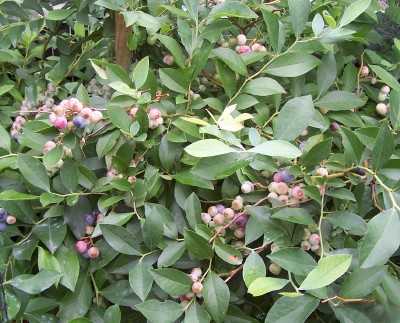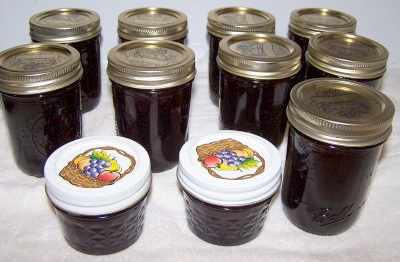
Blueberry U-Pick Orchards in Eastern Nova Scotia, Canada in 2025, by county
Below are the U-Pick orchards and farms for blueberries that we know of in this area. Not all areas of any state, nor even every state, have blueberries orchards that are open to the public. If you know of any others, please tell us using the add a farm form!
Remember to always check with the farm's own website or Facebook page before you go - or call or email them if they don't have a website or Facebook page. Conditions at the farms and crops can change literally overnight, so if you want to avoid a wasted trip out there - check with the farm directly before you go! If I cannot reach them, I DON'T GO!
PLEASE report closed farms, broken links and incorrect info using the "Report Corrections" form below.
New! As inflation remains high, see this page for
reliable (tested) brands of generic canning lids at lower
costs, and cost-saving measures for
getting fruit and vegetables and home canning.
If you are having a hard time
finding canning lids, I've used these, and they're a great price & ship in 2 days.
New! Road tripping and camping is a great way to have a fun, safe and inexpensive family trip. The national and state parks and monuments are open, and campgrounds usually cost between $10 and $40 per night. September to November is the best camping weather. See our new website Road Tripping and Camping.com for tips, tricks, guides, checklists and info about parks, monuments and other places to visit.
New! We just went live with our latest website, FunFactoryTours.com - As they name implies, you can find a fun factory tour, including chocolate, automobiles, historical forts and sites, famous buildings, Active Federal facilities even fun geology: like fossils and volcanic areas
Cape Breton
- Every Berries' Business - blueberries,
3792 Trans Canada Highway Kilometre 19, Glendale, NS B0E 3L0. Phone: . Email: sarahmacdonald52@yahoo.ca. Open: call for an appointment. Directions: . Click here for a map and directions. Payment: Cash, only. Nomatch.
Blueberry
Blueberry Picking Tips, Recipes and Information
Blueberries are one of the easiest fruit to prepare and serve. There's no peeling, pitting, coring or cutting. They have few natural pests, (other than birds), so pesticides are generally unnecessary! This year's crop is fantastic (see related news story), thanks both to the weather and to more farms planting more blueberry bushes due to increased consumer demand over the past few years as more studies proclaim the anti-oxidant and other health properties of blueberries.
Click here to find a local Blueberry Festival (usually held between April and July).
If you are looking for information about a similar berry, the saskatoon (also called the June berry or Serviceberry) see this page about saskatoons.
 Picking
tips:
Picking
tips:
Select plump, full blueberries with a light gray-blue color. A berry with any hint of red isn't fully ripened.
Ripening AFTER picking?
First, it is key to know that once picked, blueberries will NOT become any sweeter, nor will the flavor improve. The only change that occurs is the color. They will APPEAR to ripen, but it is only a color change, from white to green to rose to red to pale blue to fully blue. So, white and green colored blueberries will not "ripen" after they are picked; while blueberries that have already turned purple, red or blue-ish usually DO change color after they are picked (if they are kept at room temperature to "ripen").
As the blueberries ripen ON THE BUSH, the flavor goes from tastless to bitter to tasteless tart to tart blueberry flavor to sweet blueberry flavor.
Grocery stores sell blueberries that are tart, not sweet because they had them picked unripe by machine so they are very firm and can handled being bumped around in shipping. They may look good, but are not as tasty as those picked when actually ripe.
So, the key is, PICK ONLY RIPE BERRIES!
How to pick blueberries
Since blueberries hang on the bushes in bunches a but like grapes do, the easiest and fastest way to pick them is hold your bucket under them in one hand and with your other hand, cup a ripe bunch and gently rub them with your fingers. The ripe berries will drop into your bucket, while the unripe ones will remain attached to the bush.
When the bushes are at peak, I can easily pick 2 gallons per hour (if I'm not being distracted by the kids and the sun isn't too hot!). A newbie might do 1 gallon per hour.and at the beginning or end of the season it takes more time as the berries are not as plentiful nor concentrated in clusters.
Tips for storing blueberries after harvesting:
- Once picked, don't place the berries, still warm from the sun, in a closed bag or container. Leave the container open so moisture doesn't form in the container.
- Don't wash berries until just before using, to prevent berries from becoming mushy.
- Chill berries soon after picking to increase shelf life. Store your fresh blueberries in the refrigerator as soon as you get them home, without washing them, in a covered bowl or storage container. If refrigerated, fresh-picked blueberries will keep 10 to 14 days.
- Freeze berries in freezer containers without washing to keep the skins from toughening. Place berries one layer deep. Freeze, then pour the frozen berries into freezer containers. Because unwashed blueberries freeze individually, they can be easily poured from containers in desired amounts. Remember both frozen and fresh berries should be rinsed and drained just before serving. Just before using, wash the berries in cold water.
Blueberry Measurements and Conversions
Keep in mind that blueberries vary considerably in density and moisture content, so these ranges are approximates.
-
1 gallon of blueberries weighs about 7.5 lbs or (4 liters of blueberries is about 3.5 kg)
-
1 pint of fresh blueberries weights about 3/4 of a pound. (1 liter of blueberries is about 700 grams)
-
1 pound of fresh blueberries is usually between about 2 and 3 cups of berries.
-
It takes about 4 cups (about of blueberries to make a blueberry pie (see this fantastic and easy blueberry pie recipe)
-
A normal batch of blueberry preserves, jam or jelly requires 5 pints of berries.
-
Blueberries do come in a variety of sizes from small (190-250 berries per cup) to extra large (<90 berries per cup).
Blueberry Recipes, Canning and Freezing Blueberries
Recipes
- The world's best Blueberry pie, recipe and directions and illustrated!
- Blueberry buckle coffee cake: illustrated directions for this great crumb-topping blueberry coffee cake
- Other easy directions to make blueberry desserts: cobblers, etc.
Canning, freezing and other blueberry recipes:
- How to Freeze Blueberries
- How to Can Blueberries
- How to Make Homemade Blueberry Jam
- How to make blueberry jelly
- How to make and can blueberry
syrup (it works for strawberries, raspberries and blackberries, too)

- blueberry pie filling to use later,
- blueberry butter
Baking tips
If you have trouble with blueberries settling to the bottom of muffins and blueberry breads, try one or more of these tips:
- Coat them with flour before adding to the batter. Just gently shake the blueberries in a bag (plastic or paper) with 1/2 cup of flour, then dump them mix in a sieve to remove excess flour.
- It may just be that your batter is too thin. try making the batter a little thicker!
- Fill the muffin cups or baking pan up to 1/4 full with batter (which hasn't had blueberries added to it yet); then stir the blueberries into the remaining batter, and continue to fill the muffin cups or bread pan. The blueberries will start off higher in the mix!
Other Local Farm Products (Honey, Horses, Milk, Meat, Eggs, Etc.)
(NOT pick-your-own, unless they are also listed above)
- Farm markets and roadside stands
- Local Honey Finder
- Local Meat, Milk and Eggs
- Venues: Farms, Wineries, Orchards for your event, wedding or party
- Easter egg hunts
- Children"s consignment sales
- Fruit and vegetable festivals
- Winery tours and wine tastings
- Horse rides, stables, lessons, trails
- Maple Syrup farms and sugarworks
- Bed & Breakfasts on Farms, Wineries, Ranches and Orchards
- Pumpkin patches
- Corn mazes
- Zombie Paintball venues
- Christmas Tree Farms & lots
- Environmental resources
- Consumer fraud information
- Wholesale food sources
- Resources for Farmers
Looking for canning equipment and supplies?
Water bath canner with a jar rack
Pressure canners for gas, electric and induction stoves: Presto 23Qt or T-fal 22Qt
Canning scoop (this one is PERFECT)
Ball Blue book (most recent version)
Jars: 8oz canning jars for jams
Find Other types of farms:
Farm markets and roadside stands
Road trips and camping resources
Local Honey, apiaries, beekeepers
Consumer fraud and scams information
Home canning supplies at the best prices on the internet!
Maple Syrup Farms, sugarworks, maple syrup festivals
Environmental information and resources
Farms For Your Event for birthday parties, weddings, receptions, business meetings, retreats, etc.
Festivals - local fruit and vegetable festivals
Get the
most recent version of
the Ball Blue Book
With this Presto 23 quart pressure canner and pressure cooker, you can "can" everything, fruits, vegetables, jams, jellies, salsa, applesauce, pickles, even meats, soups, stews. Model 01781

You can make jams, jellies, can fruit, applesauce, salsa and pickles with water bath canners, like this Granite Ware 12-Piece Canner Kit, Jar Rack, Blancher, Colander and 5 piece Canning Tool Set

